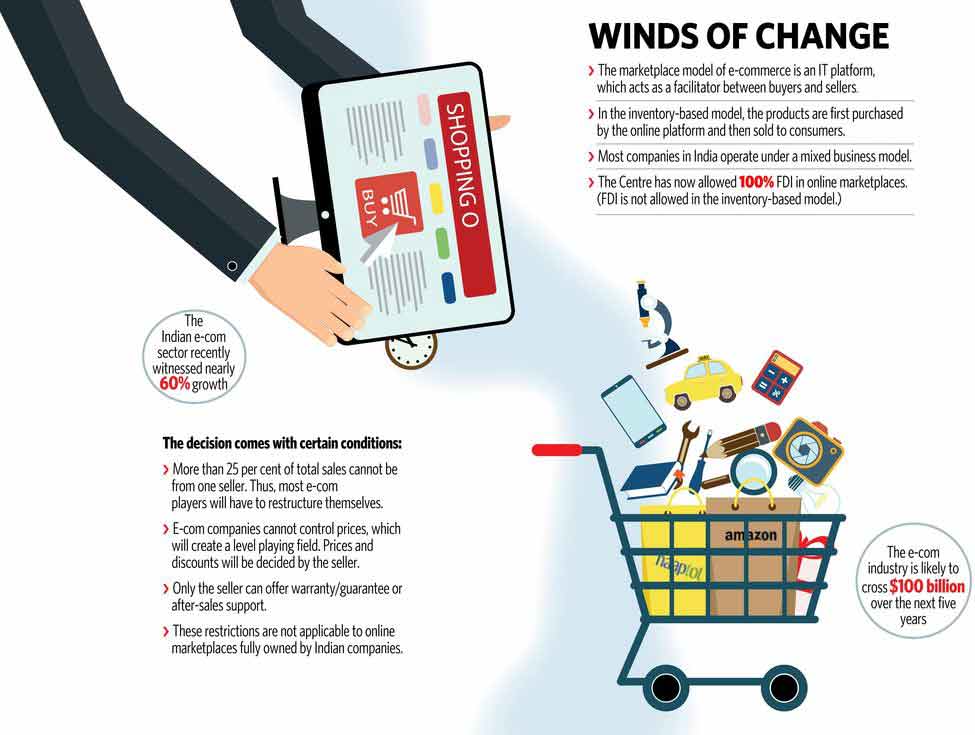The Union government's decision to allow 100 per cent foreign direct investment (FDI) in the e-commerce sector for companies following a marketplace model is expected to bring about a change in the functioning of most such companies in India. It could force online retailers to widen their seller base and influence the quality of service and delivery of products.
Experts are divided about the decision. In the short term, it could complicate the situation as companies will have to restructure to meet the new guidelines. Companies with a mixed business model will be the hardest hit as they will have to make a lot of changes. In the long run, however, it will be a good move for the marketplaces as they will be able to get the investment they need to expand. Akash Gupt of PwC India said the decision brought clarity on FDI policy and the marketplace model, which was long overdue. “While 100 per cent FDI is permitted, it also lays down operational guidelines to ensure that the window is not misused,” he said.
Some feel that the new rules will ensure that only the fittest will survive. “The notification will ensure that performance-driven companies will succeed against funding-driven companies. This will also give Indian funded companies a great chance to succeed,” said Srikanth Palem Reddy, founder chairman of LatestOne.com, an online technology player.
As per the new notification, e-commerce companies will no longer be allowed to directly or indirectly control prices. This means that prices and discounts will be decided not by the e-commerce company, but by the seller, who generally does not have as much cash to burn. Also with one group company or retailer not being allowed to make up more than 25 per cent of the sales on a marketplace, companies will have to broaden the base of their sellers. This will restrict their ability to offer discounts.
“We will see the market shifting from a discount-driven business model to a seller-driven one, with offline retailers and inventory based e-commerce companies able to compete with marketplaces on prices. It will also push marketplaces to add more sellers to their platform,” said Suman Singh, chief executive officer of Bajaao, a direct online retailer.
Experts said since the new rules would restrict discounts on goods, it would also shift the responsibility for after-sales service and warranty fulfilment to individual retailers. But it also means customers cannot hold the marketplace responsible for any problems. Instead of the generally reliable after-sales service system offered by the marketplace, customers will have to deal directly with individual retailers. Manu Agarwal, founder of Naaptol, a virtual home shopping brand, however, said the new set of rules would further benefit customers by addressing post-sale issues effectively.
So far, e-commerce marketplaces have been working like quasi retailers in India because of the rule that prohibited multi-brand retailers from raising FDI. They have never been forthcoming about details of the real sellers. “Hopefully, the new rule will get marketplaces to collaborate with brand owners and dissuade them from participating in discounting from their pockets and ensure that they do not portray themselves as retailers,” said Kumar Rajagopalan, chief executive officer of the Retailers Association of India.
According to the guidelines issued by the department of industrial policy and promotion, “in the marketplace model, goods made available for sale electronically on website should clearly provide name, address and other contact details of the seller.” This will ensure that consumers will know who the real seller of the products is right at the time of purchase. This will also control the sale of fake products.
 Graphics: Job P.K.
Graphics: Job P.K.
“The condition that an e-commerce firm will not be permitted to sell more than 25 per cent of its total sales from one vendor or its group companies will prevent marketplaces from behaving like retailers,” said Mahesh Gupta, president, PHD Chamber of Commerce and Industry. “Also, guidelines such as marketplaces cannot offer warranty or guarantee for products sold on their platform will ensure that they will not make promises on behalf of sellers to influence purchase decisions. It will certainly create a level playing field for offline retailers.” Harkirat Singh, managing director of Woodland, one of the leading shoe manufacturers in the country, said the move would benefit small businesses and suppliers through better market access and world-class technology.
Joginder Chhabra, head, market and consumer insights at LG Electronics India, said the valuations of the existing e-commerce players would be affected in the short run as revenue growth would be hampered. “The new policy might bring an end to the huge losses because of the restriction on deep discounts and some sort of consolidation might happen in this regard. The next level of funding of the existing e-commerce companies will also be impacted as some of the existing e-commerce players were lobbying for FDI in inventory-based model to enable them to sell directly to the consumer as well. On the flip side, they may have to face competition from big investors from China, Japan and other countries, who did not enter India earlier because of the absence of a clear and tangible FDI policy in this sector,” said Chhabra.
The National Association of Software and Services Companies (NASSCOM) said limiting sales of a vendor to 25 per cent might prove to be restrictive, more so if the company sold high value items. The industry, for instance, might face difficulties in case of sale of electronic items, where a vendor may be offering exclusive access to certain items or discounts.
Sameer Rastogi, an expert in corporate law, said the limit should not be more than 5 to 10 per cent. “Also, the notification says in a marketplace model, any warranty or guarantee of goods and services sold will be the responsibility of the seller. However, for the buyer, it is easy to contact and catch the e-commerce companies as compared with the seller in case of any default.”







